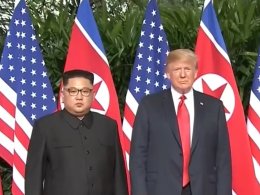Responding to growing sanctions from the West, China and Russia reportedly are finding a way to circumvent them by going back to the barter system that existed between the two nations at the fall of the Soviet Union.
According to a report from Reuters, a barter trade deal could happen as early as fall because Chinese banks have begun to reject any financial transactions between China and Russia to avoid having U.S. banking systems monitoring their transactions, and implementing additional restrictions.
For a time, China was using smaller regional banks to make the transactions because they were harder to track after larger financial institutions, like the Bank of China, refused to process yuan transactions with Russia. However, smaller Chinese banks are now doing the same to avoid penalties.
A barter system would limit the risk to currency, and currently Russia is developing regulations around barter trade with China, according to anonymous sources who spoke to Reuters.
The BRICS alliance, which involves Brazil, Russia, India, China, and South Africa, as well as Iran, Saudi Arabia, Egypt, Ethiopia, and the United Arab Emirates, could help get Russia and China out of the eye of the West if they are able to form financial systems linking to each member country. The alliance was designed to undermine the political and economic powers of Western Europe and North America.
According to a report from the Council on Foreign Relations published in March, Russia and China have long had a history of barter trading with each other, and it was especially prevalent pre-fall of the Soviet Union in the 1990s.
Despite this collaboration, the report goes on to state the ties between China and Russia are tenuous at best, with experts noting the alliance has more to do with the rivalry they both have with the United States, rather than a natural friendship. However, the report further notes that the two leaders – Xi Jinping and Vladimir Putin, have a personal friendship with each other.
The economic power between the two nations is also not balanced, with the report pointing out Russia relies more on China for trade supplies.
"Russia depends far more on China than vice versa, which has generated concerns in Moscow. For example, while China has become Russia's No. 1 trade partner, Russia was only China's sixth–largest trade partner as of 2023. Russia also relies on Chinese companies and banks for critical investment in its energy and telecommunications infrastructure," the report states.
During an episode of "Mornings with Maria" on Fox Business, Heritage Foundation's Senior Fellow Michael Pillsbury told host Maria Bartiromo that U.S. House of Representatives Speaker Mike Johnson, R–La, is going to declare a "China week" at the end of September to address growing concerns around Chinese investments.
"Speaker Johnson is going to declare a kind of China week at the end of September. Anybody who wants to bring things to the floor on China is welcome, he's already endorsed … pieces of legislation, they're really quite historic. This is the biggest deal in probably 10 years, it's the biggest deal in a long time from the congress," Pillsbury told Bartiromo.
Pillsbury noted there are Democrats who also support passing legislation to protect American interests from China, who have in recent years been known to spy, and steal intellectual property.
Congress is further considering doing away with a waiver on tariffs for Chinese goods valued under $800. Former President Donald Trump has already hinted he will be raising tariffs on China if he wins the presidential election this coming November.
Pillsbury noted the trade deal between the U.S. and China during Trump's first term was the biggest trade deal in history, but the Chinese are not holding up their end of the bargain to purchase a certain amount of American goods.
"That trade deal is the largest in history, it's got the two biggest economies, China and the U.S., agreeing to 100 pages of new rules, but as you know Maria, the Biden administration did not enforce it. The Chinese did not make the $200 billion in purchases they promised in writing. Biden did nothing about it, and worst of all, the Biden team has not been successful in getting the talks going again, the Chinese just cold shouldered them," Pillsbury said.
Pillsbury further stated China is giving tax breaks to companies who push fentanyl into America.
"We also don't have good information, other than intelligence sources, on how big the fentanyl problem is, which Mexican cartels are behind it, who in China does the actual cooking of the product. I think you know about their website. The Chinese give tax breaks to companies who push fentanyl to America. It's pretty outrageous. It's one of the findings of the House Select Committee that's been largely ignored," Pillsbury said.
U.S. officials are visiting China this week to talk about economic stability and curb the flow of fentanyl into the U.S. – the controversy around China's business dealings has resulted in a total of $15 billion being pulled out of China by foreign investors in the second quarter of 2024, according to Bartiromo.









